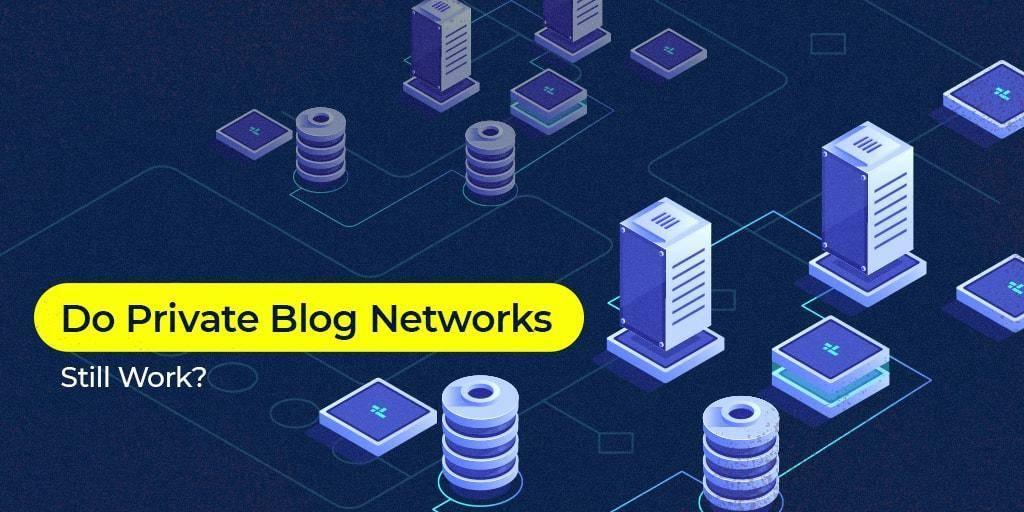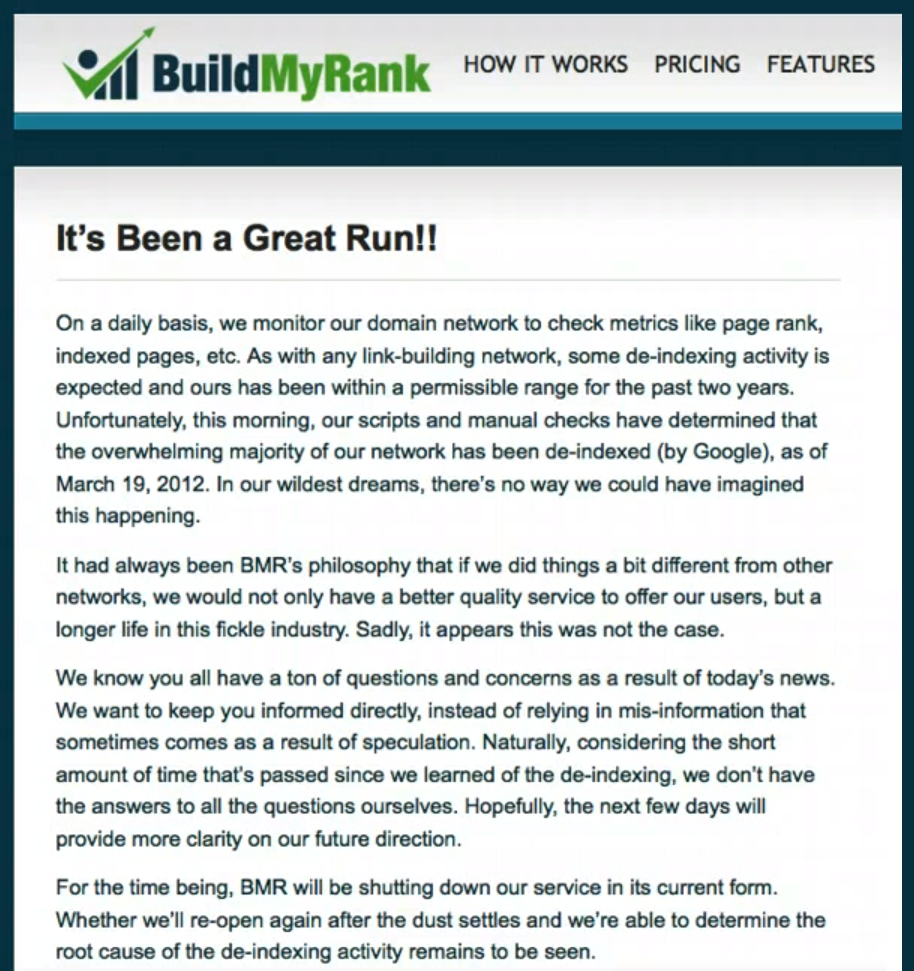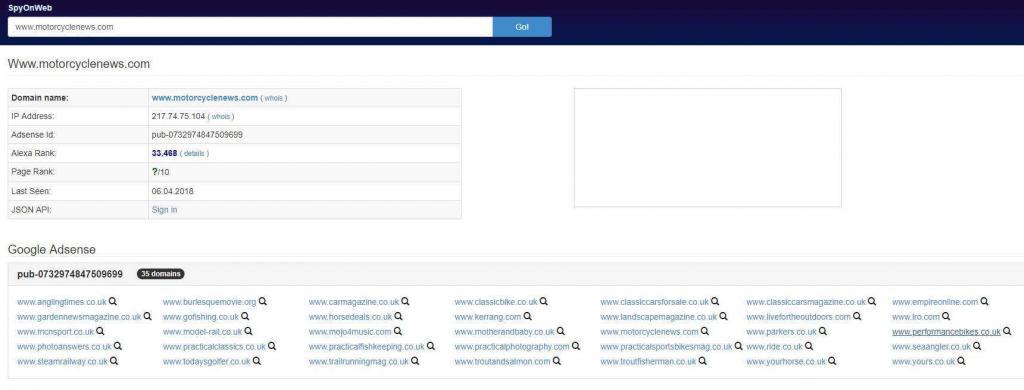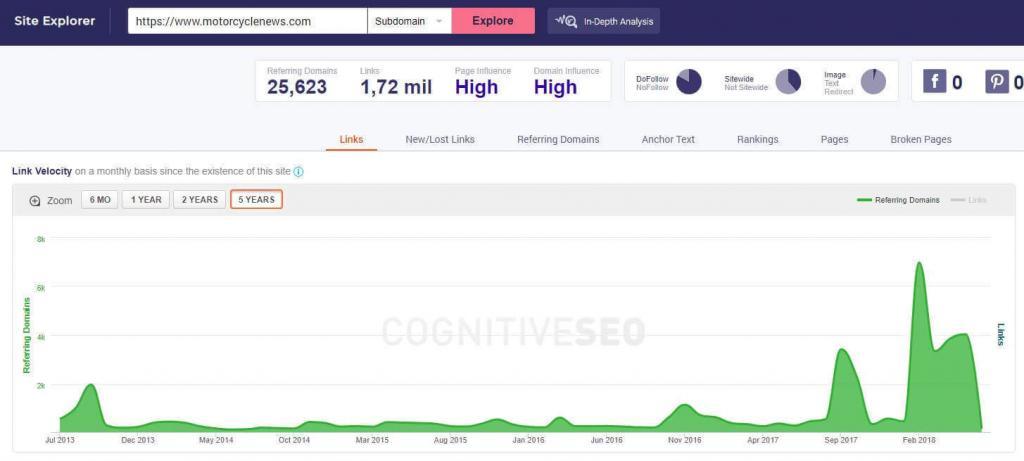If you use SEO to promote your website, you most probably have heard of PBNs (Private Blog Networks). The concept isn’t very difficult to understand (although it is difficult to execute), but with the overload of information out there, you might be conflicted.
Do PBNs still work in 2022? Are there any risks? Well, the short answers are yes and yes. So should you build one? That’s up to you. However, this article has to purpose to help you make an educated decision. This won’t be a guide on how to build one; however, if you’ve thought about building a PBN for your websites, then make sure you’re giving this a good read.

Disclaimer: Just to get things straight from the start, we do NOT recommend building a PBN. They are risky and against Google’s terms of service. They also cost both time and money which you could be investing in safer and more efficient, evergreen tactics.
What Is a PBN?
PBN stands for Private Blog Network. Long story short, it’s a group of websites that a webmaster owns for the sole purpose of boosting the rank of other websites.
These networks fall into the BlackHat SEO link building tactics category. Obviously, at first, they didn’t. But after people started abusing them, Google took action. Before 2014, PBNs were the stuff. The hype was high and everyone started building them. Everyone wanted to get in for the ride.
That was until Google completely destroyed a few PBN services and some popular marketing bloggers’ PBNs. Here’s just one example of a single PBN service out of many that have fallen:

The truth is that PBNs are nothing more than Web 2.0s on steroids. Instead of using subdomains from WordPress.com and Blogger, you use expired domains that already have authority built to them. If you purchase the right expired domains and build the network properly, you can get yourself a nice asset.
In order to avoid getting caught by Google, BlackHat SEOs have to constantly hide their traces. What a tiresome struggle… This list of traces can contain:
Whois Info: If you have 10 domains that all link to one another and are all registered publicly under the same name, everyone is going to know it’s a PBN. Now most of the time the details aren’t public and you can also purchase Whois protection for extra fees (sometimes offered for free) but I’ve heard stories of Google having access to Whois info anyway.
IP Address & Hosting: If more websites are on the same IP, they’re definitely connected in some way. That’s why shared hosting accounts are dangerous. If someone spams that IP address, you’re also on the list. You can purchase dedicated IPs for each domain to fix this. (Not only for PBN sites. Do this for all your sites. It helps keep things safe.)
Company name and contact details: Some countries legally require you to post this information if you monetize your site in any way (you do, since it’s part of your marketing strategy, so if someone reports you, you risk getting fined).
Design, Code, Formatting, Content: Many times, people simply duplicate these websites by copy pasting and changing some basic aspects, like colors and logo. However, the platforms and themes they use are always the same.
Analytics Accounts: Have 10 sites under the same Analytics Account? Good luck evading Google.
Script IDs: If you have different tools that require tracking, you’ll need separate subscriptions for each and every one of them, otherwise anyone could figure out the connection between two sites.
Now these are the most basic ones and they are often publicly available. However, some people say (including me) that Google might be looking at other things as well:
E-mail accounts: Register anything under the same e-mail, especially if it’s a Gmail and you’ll end up linking everything to it. One mistake and you can compromise it.
Location: Have you logged into the same e-mail account or worked on all your PBN sites under the same IP at home? Good job, you just told Google you own them. You need proxies and proxies to keep things clean.
Doesn’t this sound sort of like a hacker or criminal hiding his !@% from the police? I actually never understood why Google doesn’t try to make these things illegal. I mean… if you’re spamming the internet and accessing the website with bots without the owner’s permission… If you’re constantly pretending to be someone else… Shouldn’t this kind of stuff be fined? I guess they either can’t or they just want people to keep doing them.
Now call me paranoid, but we use so many services from Google, such as Chrome, Analytics, MyBusiness and Gmail. They’re all owned by Google. Am I saying that Google is reading your e-mail to figure out if you have a PBN or if you’re buying links? No. But… Maybe?
Your Gmail account is probably connected to your smartphone. You have the internet connection on everywhere these days, so Google knows your location. You and another webmaster appear at the same location and 2 hours before your websites start linking to each other? Just saying…
Those are just speculations but think of it: If you wanted not to be caught owning two different hosting accounts, would you register under the same e-mail? Most definitely not. I’m not saying that someone from Google is reading your private e-mails and spying through your webcam. I’m just saying that there is a possibility that some sort of algorithm is out there, tracing administrative relationships between websites.
Do PBNs Still Work?
You’re probably wondering if PBNs still work. How much has Google evolved and how good is it at catching these schemes in 2021?
Well, despite what many people think after 2014, PBNs still work and they will work as long as backlinks are a ranking factor, something that won’t change very soon.
How Google tricked everyone and was always one step ahead
When PBNs started to become popular, I’m sure that both parties were somewhat terrified. The webmasters of getting caught and Google of people discovering the ultimate BlackHat SEO technique.
However, Google was also one step ahead. I’ll explain:
You see, as mentioned before, Google cares about backlinks. Link building is still a very important ranking factor. They’ve tried removing the links from the algorithm, but apparently, the search engine results are worse:
A PBN can’t really be detected if it’s done properly. There’s simply no way of finding out, or at least being sure. Everybody links to other websites. People know each other, they talk and they give links. If you banned solely on patterns, innocent people doing White Hat SEO might get hurt. You might as well ban everyone, right?
So what did Google do? How did they catch the ones that were truly thinking of building a PBN as a BlackHat way of ranking their money sites high? Well… they didn’t.
Instead, Google targeted a few popular PBN services and some popular marketing bloggers that were using them and blogging about them.
Today we took action on a large guest blog network. A reminder about the spam risks of guest blogging: http://t.co/rc9O82fjfn
— Matt Cutts (@mattcutts) March 19, 2014
But how? How could Google possibly identify an entire network of private websites, built by professionals and experts in the BlackHat SEO industry? Well… it’s an easy answer. They bought the service. It’s that simple.
I mean… everyone could. Even Matt Cutts. Just order the service and know exactly what PBN sites are used. Worst part? Many people and local business owners had to suffer. Their websites got penalized and they did not even know how, because their SEO companies acted as intermediaries and bought the PBN service instead. It happens all the time: “Guaranteed #1 position.” and also guaranteed “It wasn’t me boss” in case of penalty.
How did Google get to the marketing bloggers? I have no idea, but I’m sure they were targeted. Don’t you think it’s kind of strange that immediately after, many popular marketing and SEO bloggers got their PBNs penalized, while hundreds of other unknown players kept saying that they worked? Had it been just a Google update and no manual verification, it could’ve been a disaster.
After getting penalized, both Spencer Haws and Pat Flynn (two very popular niche site builders and bloggers, you should check them out) turned 180 degrees, writing about how much time and money they put into their PBNs just to lose everything in one second. And then the almighty phrase started showing up everywhere: “PBNs are DEAD!” No… they’re not. They’re just very risky. However, people stopped jumping head first into it.
The fine line between PBN and owning multiple sites
I collaborated with a pretty big nutrition and fitness company. It was really hard work as I did all the content and promotion (although I had nothing to do with bodybuilding). Anyway, I did a lot of research before writing anything and managed to pull up great quality content that increased the organic traffic of the website by 30% in under 6 months.
Bragging aside, one thing that was really difficult about that particular project was that there were simply no websites to get links from. Why? Because almost all the websites were owned by 3-4 companies that were direct competitors. At least that’s what my boss told me, but I tend to believe him since he’d been in the market for over 10 years.
I started doing some research to find link opportunities and found out that these websites were all linking to one another.
See where I’m going with this?
While the fact that I had nowhere to get links from was frustrating, the fact that I discovered a PBN was fascinating.
There was just only one issue:
This wasn’t really a PBN. Nobody was getting penalized. I even reported this to John Mueller but my request was completely ignored. Why? Well… probably because the websites were completely legitimate businesses, with their own phone numbers, teams and services. You could very well order products from them and they would send them to you under their name.
And that’s when I started thinking that the PBN issue is much bigger than it seems. Is that really a PBN? Not sure… Can Google detect it and consider it a PBN? Probably. Should it penalize it? I don’t think so.
I believe that multiple websites from the same company can create a network that dominates the first pages of Google. On multiple positions.
I did a little research just to prove that this is the case for various markets and countries. While looking into the motorcycle niche, after only 2-3 searches, I bumped into this motorcycle news website (motorcyclenews.com) that ranks very well for some keywords.
I then used SpyOnWeb.com to determine if any other websites are linked to it via IP or some code. Turns out that many are. The relationship has been established through the Google Adsense account.

Then, I used cognitiveSEO’s site explorer to take a quick look at what websites are linking to it:
I only searched some websites that are in the same niche, like performancebikes.co.uk, ride.co.uk, classicbike.co.uk and mcnsport.co.uk. They all link to motorcyclenews.com. These are only 4 sites, but there could be others that are not so easily correlated.
Could this be considered a PBN? Maybe. But they’re all legitimate, authority sites that sell bikes or offer some sort of service. All of them generate organic traffic, offer interesting and good quality content and some even have physical, printed magazines.
Is that unethical anymore? Should it be against Google’s TOS?
Imagine that you build a very successful coffee shop. How do you expand? Do you make the same shop bigger and bigger until it eats up the whole city? No, you open a new one in another city and another city and so on. But do you make cheaper, worse coffee and just recommend people to your main shop in the primary city if they want to drink the good one? Of course not. You serve them the best you can if you want them to stay. And when they visit the initial city, they’ll know where to go.
It’s the same with these websites. Sure, you can’t call them all Starbucks, but you can build new ones all the time when you want to expand and they’ll all survive and thrive as long as they all provide quality to the users. And not even interlinking or using the same IP will be able to get them penalized.
Google’s only request is to provide quality to the users, so that they keep coming to Google to search and find YOU, because that’s how Google survives. If bad websites rank at the top because of some PBN scheme, people won’t like Google anymore.
Most PBNs are websites that lack design, personality and usefulness. They just fill the web and use Google’s resources (for crawling, indexing and other things).
However, if these websites are good, I don’t think anyone will have a problem. You can’t even call them a private blog network, at least not in the BlackHat SEO way of saying. In my opinion, it’s perfectly White Hat to have multiple high quality websites.
However, you can still get penalized…
PBN Advantages & Disadvantages
Although PBNs do have advantages, in our opinion, the disadvantages overweight them so we do not recommend that you build a PBN.
However, we will outline them, just to make sure you’ll get a good overview of things.
Advantages:
More efficient with ranking: From all the BlackHat SEO techniques, PBNs are probably the most efficient. The better the expired domain names you purchase, the faster you’ll see the results.
Harder to get caught: Also, it will take some time until you get caught, if you get caught. You’ll have to be always looking over your shoulder and erase your every trace. It’s not an easy lifestyle, but it’s safer than blasting links with GSA Search Engine Ranker.
Easy in theory: Buy expired domains at a domain auction, build websites and put content on them, cover up all traces, link to money site. The part with covering up all traces is a little bit more difficult, but you’ll get the hang of it. That is if Google doesn’t hang you first.
Extra profit: You can also profit off PBNs by selling links to other websites. As long as they’re not direct competitors, it doesn’t really matter. However, keep in mind that this exposes you to risks. Someone could compromise your network.
Full control: This one is the best one. I have to admit…. don’t you just like it when you’re in control? No more “Here’s my nice content, will you link to it?”
Disadvantages:
High cost: At first it might sound cheap. Some shared hosting, a couple of IPs, some domain names and some content. Couple of hundred bucks? Well… make that double. Then multiply it by 50. If you really want to do this the right way, you’ll need good hosting, tons of IPs, proxies and tools. Sure, you could only be spending $1.000 on your network if you’re in a low competition market, but will the investment be worth? For high competitiveness you need to buy expired domains that have a high authority and you need a lot of them, at least 10-25. You also need to make sure they aren’t spammed. They can go for thousands of dollars each and we haven’t discussed the content yet. You think 500 word spinned articles will do the job? Think again, or the Panda’s gonna catch you.
Takes a long time: Although when you start linking the results are seen rather fast, the whole setup process is time consuming. You start with one site, then expand, but each takes time.
Difficult to manage: You’ll also have to constantly take care of your network. Excluding the content that you need to keep posting, each site comes with its own problems like SPAM, hackers, bills… and remember you have to do them all under a different name, IP and probably device as well, just to make sure.
Can get caught: The worst part is obviously that you always have the risk of getting caught. Is it worth investing all this time and money for it?
Should You Build a PBN in 2021?
This really depends on who you are as a person. Do you like taking risks? Do you care about Google’s TOS? Some people see Google as this evil entity that controls the internet and would love to profit off it.
You see, the truth is that great websites on Google, that always rank at the top, don’t need to build PBNs.
Webmasters that provide great content, that network and connect, that promote their content, products and services properly don’t need to use any kind of schemes to get to the top.
They will always be there or at least they will get there at some point, because the users dictate this.
So should you build a PBN? Probably not. We consider it to be wiser to spend all that money and time to develop one website first. Then you can expand to another website and another one and have your little legit network of high quality websites.
Spending thousands of dollars and hundreds of hours on simply buying expired domains and filling them with content you don’t really care about instead of spending it into user experience, quality content creation, promotion and better services doesn’t seem very wise.
At the end of the day, it’s a mix of time, skill and luck that decidess whether you’ll get caught with a PBN or not. You might get caught after the first 2 weeks. You might never be caught and even your grand grandchildren will use your PBNs to profit. However…
If you’re in for the long run SEO game, you’d better stay away from PBNs and focus on evergreen White Hat SEO techniques.
Search Engines are always evolving and getting better at detecting tricks every day. Why not focus on playing fair and actually improve the skills that truly matter? Why waste your time with learning how to hide when you can learn how to create better experiences?
Whatever side you’re on, we’re curious about your experience with private blog networks. Have you ever owned one? Have you ever tried a PBN service? Have you got penalized? Do you still own one and does it still work? Let us know in the comments.

 Site Explorer
Site Explorer Keyword tool
Keyword tool Google Algorithm Changes
Google Algorithm Changes


Motorcycle News is an interesting example when it comes to networks of sites, and I know it well as I worked on it, and ran it for a few years (A while ago now)
Part of the reason it won’t be penalised is that it’s part of Bauer Consumer Media, which is massive magazine publisher with lots of leading titles. So the other bike titles have all been part of the portfolio and interlinked for a long time (although not as much as they probably should have done in the past). And as you said, they all have separate print and web products, even if some writers work across titles.
Plus they’re also all linked from the main Bauer Consumer Media site, so the network isn’t being hidden in any way.
And as the leading bike title in the world, MCN has got a huge amount of link diversity and authority in motorcycling, so it’s not solely relying on links from it’s own network…
One thing that does differ between publishers is whether they still use footer links between relevant titles – it’s largely stopped now after a case study was shared for Cosompolitan (owned by Hearst).
So I think the main thing is that there’s a difference between big, public, legitimate companies with multiple websites (and products), as opposed to the private networks which carry more risk if discovered…
Great insights on that. I’ll research the study about Cosmopolitan (sounds familiar). Yes, the motorcycle network isn’t a PBN. However, I tried to point out that the supplement sites in Romania, which resemble more of a PBN (different servers, very few traces) is still actually a network of sites, similar to the Motorcycle one.
The thing here with PBNs is that once a big publisher such as Bauer Consumer Media gets to the top, it’s very hard.
Oscar says below that PBNs are a response to Google not ranking good content well enough. I’d argue that they are a response to Google ranking the best content, which in this case, unfortunately for anyone trying to start something in the automotive industry is, apparently, the Bauer Consumer Media.
It is kind of sad though, that you do need money to achieve great results, even in SEO, but you can also do it with a great mind, twist, strategy and some time.
Sadly, great quality content is no guarantee of success. I’ve seen great websites overranked by poor ones and great content that never gets shared. PBN’s are a response to it. SEO is risk management and whoever use a PBN he/she may be aware of consequences.
Oscar, I disagree.
Had it been the best content, it would’ve been ranked first.
While I agree that content itself can’t do it (or better said, the information alone), I think it really matters how you present it and, more importantly, how you deliver it in order for it to be successful. PBNs have no place in this, at least not in the long run and not for big, respectable, solid businesses.
Look at Brian Dean, for example. He probably spent on his content and delivery as much as some spent on PBNs, but he doesn’t have to do any risk management.
And what I disagree with most is this “hoever use a PBN he/she may be aware of consequences.”
If you’re doing it for yourself, fine, but most people do it for other people, which have no idea of the risks involved.
Good article, thanks.
IMO the Motorcycle News example is not a PBN, it is “natural” interlinking between brands owned by the same group and they are not trying to hide their association. MCN has been published in the UK for many years and is owned by a large publishing company (Bauer). The other sites linked by the GA account are all Bauer publications.
For something to be judged a PBN, then the association between the sites needs to be hidden, or at least an attempt has been made to hide it.
I agree with it. As long as it’s not hidden, obviously it’s not a PBN. Yet if you start building sites without hiding it for the sole purpose of getting ranked higher, you might still get penalized.
The Motorcycle example was the first I found that sort of resembles the supplements industry in Romania, which no visible links are made.
Had it not been for my ex boss to tell me, I would have only linked a couple of websites instead of 10+.
However, I consider that it’s more towards the motorcycle news network rather than a PBN, as they are very old sites, way older than the PBN concept (or at least when it got popular).
Great article, thanks.
I have a colleague who suffered a penalty due to he was a practicant of these type of strategies. His own web dissapiared from SERPs and most of his satellite blogs were closed with no advice.
Even so, I don´t think that will happen to a little site.
Yeah. Little sites are harder to catch, but leave one wrong trace and you’ll be dead. It also affects everyone else because it creates patterns which are then analyzed and added to the algorithm.
Grate article but i have qustion.is it possible for a website for rank without PBNs.you are right this method is balckhat but i think every website have one PBN.thanks
Waseem, yes. Any site can rank without PBNs but it has to put the work into the right things. However, there’s a fine line between what is a PBN. Is your personal site a PBN if you keep linking to your articles? I don’t think so. Thing is not to do it at scale.
Hello! I work in a company Name Digitofy Global, we have many PBNs which are genuine and Have DA PA of 50; my question is: are these PBNs full helpful for ranks?
Because I think that the PBNs trend has gone.
If I used PBNs, I wouldn’t put my company’s name and the fact that I used PBNs in the same place xD. Yeah, pretty much I do think they still help. Depends on their quality though.
we have some money site. All of this has the same vat, phone number and chat. Everyone of this site is linked from some of my pbn site. 1 site 1 link no cross link.
What do you think about some vat, phone number, chat is not a footprint? what about using on all the network? insane or smart?
Best Regards
I do think that phone numbers and any HTML with the same user ID of any tag can be a footprint. If I can identify that, then Google most definitely can.
I don’t know, depends on your goal. I wouldn’t bother using PBNs at all because I really want to have something legit that lasts. However, if I were in your case I’d probably not link them with same contact details and chat IDs.
Adrian, l read your article and i will try your services and l think that is one of the very few posts that really depicts the true picture.
l have 5 sites with different content and different design, so do l have a PBN? No, because l have my business site and then l needed a more bit personal blog aside, so l did one more and one more.
Thank you
Excellent Work.